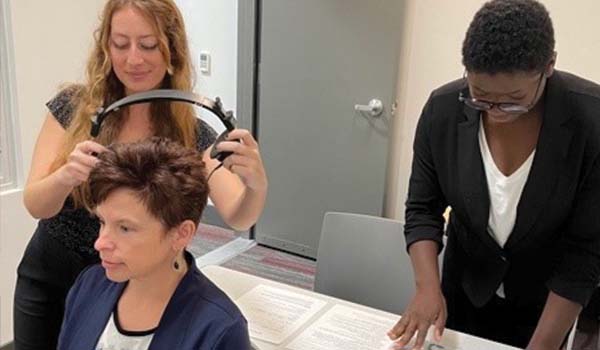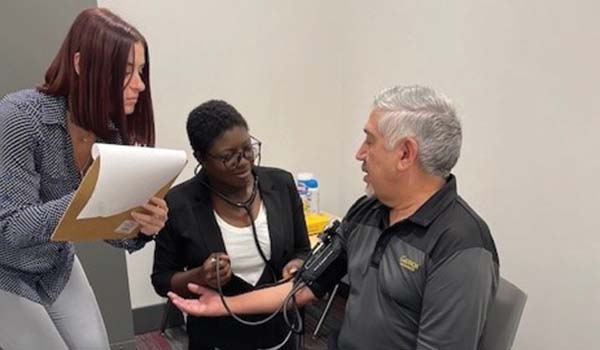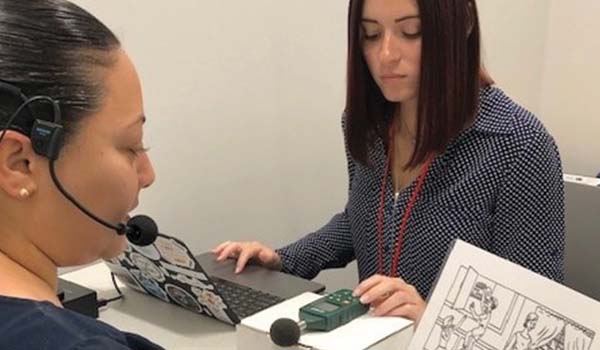The clinic space of Ruskin’s North Building has become a hub of an uncommon inter-disciplinary research initiative designed to enhance quality of life among older populations.
On cue, an elderly patient vocalizes a series of prolonged sounds, zzzzz, sssss, as speech-language pathology student Cecelia Enman carefully notes the duration of each on a chart to assess if the patient has healthy vocal functions.

Students perform a hearing assessment with Tania Flink, professor of sport and exercise science.
In the next room over, another elderly patient performs a series of physical exercises. With his arms crossed over his chest, he stands up from his chair and then sits back down again. He repeats this movement for 30 seconds. Detria Smith, a sport and exercise science student, carefully monitors the patient’s functional fitness.
Afterward, Diana Julbe-Delgado, professor of speech-language pathology, Albert Villaneuva-Reyes, Ed.D., program director and professor of speech-language pathology, and Tania Flink, professor of sport and exercise science, work with students to compare the results of these and other assessments. They’re not just looking for signs of healthy speech and physical fitness, but for any factors that may influence cognitive change in older adults. It’s the key focus of the two programs’ research collaboration.
“It started as a conversation in the hallway,” Flink said. “Diana does a lot of research around cognition and how the brain changes when we get older. I do a lot more physiology-based work, but my area of expertise is also in movement control, similar to speech-language pathology.”

Students evaluate blood pressure readings with Albert Villaneuva-Reyes, Ed.D., program director and professor of speech-language pathology.
Flink said this uncommon collaboration just makes sense. “The human body doesn’t work in isolation,” she said.
“(Clinicians) often only look at patients from one perspective,” Julbe-Delgado said. “For example, I might look at a patient’s speech or swallowing function. Meanwhile, there are huge issues in terms of physical fitness. We know that older adults often lose balance and coordination, and this is exacerbated if they do not maintain holistic health. Our brain is fed by both sensory and motor function.”
“Here, we’re providing older adults with education in two areas of expertise: speech-language and exercise science,” she said.
The study blends both disciplines by examining the relationship between speech-language processing and physical fitness levels and how they can predict mild cognitive impairment in older members of the community.
On testing day, students perform a battery of assessments designed to capture different aspects of speech-language production, voice production, hearing, cognition and physical fitness measures. The results from these tests are then compared with other cognitive measures to determine whether any or all measures can best predict cognitive changes in older adults.

Diana Julbe-Delgado, professor of speech-language pathology, and a student complete speech-language testing.
At the end of the session, participants will receive tips on keeping the brain healthy through brain activities, exercise, nutrition and sleep and be invited back six months later to re-test on the assessments.
Julbe-Delgado said they hope to build on their data throughout the next year to distribute to health professionals and other community members as educational tools.
This experience has prepared me for how to work interdisciplinary to create an equitable and reliable study that has a positive impact.” - Cecelia Enman
“We don’t want adults to lose their autonomy, their independence. One of the biggest things that adults will suffer as they get older is their ability to drive,” Julbe-Delgado said. “When you think about speech-language pathology and exercise science, we are targeting skills that are necessary for driving, such as cognition, executive functioning, decision-making, motor balance.”
Enman is one of four graduate students in the two programs who were cross-trained in the use of each test to assist faculty.
“I have always had an interest in working with voice patients since I joined the speech program, and this research has given me the opportunity to expand my skills and knowledge pertaining to voice measures, a normal versus abnormal voice, and perceptual differences,” she said. “Overall, this experience has prepared me for how to work interdisciplinary to create an equitable and reliable study that has a positive impact.”
Flink emphasized the importance of their ongoing research.
“Imagine having the choice of having memory, cognition, communication, or you get an extra year of your life to preserve those skills. That’s huge. That means more time with your family and friends and loved ones. That’s more outings, walks with your loved ones, and other activities you can do. That’s why we do what we do,” she said.
By Brianna Mariotti, content marketing strategist